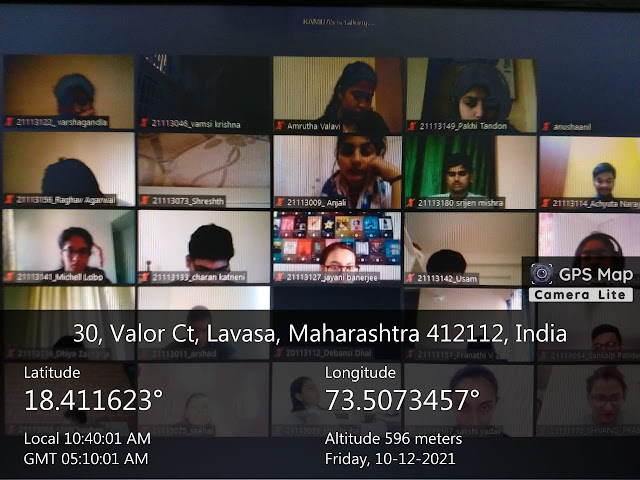HUMAN RIGHTS DAY - TRIBAL RIGHTS ARE HUMAN RIGHTS
The Human Rights Day is celebrated all over the world on 10th December every year, the date on which the Human Rights Declaration was adopted by the UNO. All over the world, this event is used to uphold respect for human rights and human dignity as the foundation of freedom, justice, and peace in the world.
To celebrate the day and creating awareness among the students, the Human Rights Committee, School of Law, CHRIST (Deemed to be University), Pune Lavasa Campus organised an expert lecture at 10:15 AM on Friday 10th December 2021 and invited Dr Ramdas Rupavath, Professor & Head of Human Rights Cell, Department of Political Science, University of Hyderabad, Telangana State who has been conducting empirical studies on Tribal population-related issues in the vast tribal belts of Andra Pradesh and Telangana states with practical experience in organizing conferences on few themes of Tribal Issues. Dr Daisy Alexander, the Professor and Head of the Department, School of Law at CHRIST (Deemed to be University), Pune Lavasa Campus began the program by telling the importance of Human Rights Day and how the tribal population is denied their rights which become a violation of human rights. The anchoring for the session was done by MsAradhya BA-LLB 2nd year student by introducing the guest to the audience. The vote of thanks was given by Mr Vishnu Sarat, BBA-LLB of the 2nd year. The Faculty coordinator for this event was Dr Sunil John and Dr Salu Dsouza, School of law, CHRIST (Deemed to be University), Pune Lavasa Campus.
Prof Ramdas Rupavath, first talked about his encounter with various tribal hamlets of Telangana and Andra Pradesh. He narrated his own practical experience, coming from a Tribal hamlet how he had to face the problem of segregation and deprival of basic necessities when he was a teenager in the village. He also informed the students about his creation of documentary and publication work that he undertook over the decades in issues concerning tribal welfare.
Prof Ramdas also spoke about the Constitutional provisions about the tribal rights and then the statutory provisions about the Tribal reservation system. Besides discussing the legislative provisions, he talked about the judicial interpretation about the matters related to a tribal population who are deprived of their legal rights and how the law fraternity, as well as members of the academia and civil society, could contribute to this to make the efforts of legislature and the judiciary more practical when it comes to looking after the tribal welfare not only in Telangana and Andra Pradesh but also in the entire country. He showed the way to law students how they can effectively work and organise legal aid camps in the various tribal hamlets in whichever state they are. He called upon the students, who are going to become lawyers to identify the practical problems which the tribal population faces particularly those who had regular conflicts with the law-enforcing authorities and the forest officials.
Further while delivering his lecture and interacting with the students, Prof Ramdas Rupath demonstrated with the students on how to identify the problems associated with the tribal population and the tools to overcome the same. The problems like illiteracy, lack of awareness, insecurity about their stay in the forest area and how continuously state is violating their natural rights and most importantly to get the best price for the various forest products they sell in the market but the educated city dwellers cheat them by offering low prices. He requested the students to organise a few camps, and participate in the awareness programmes held by state tribal welfare authorities, NGOs, researchers by creating and distributing educational material, short videos by using social media, by play, or by attracting them with certain incentives such as influencing the local best schools in getting admission to few tribal children and those who are graduated could enroll themselves for the higher education in reputed colleges, universities and also join coaching centers for civil services exams.
Thereafter, Prof Ramdas Rupavath explained the practical position and the limitation which are creating obstacles while dealing with the tribal population. Senior advocates are reluctant to give their time to taking up genuine and urgent cases of tribals. The structure which every state is using for dealing with tribal matters is also not satisfactory. He talked specifically about Chhattisgarh, and Jharkhand states, and Gadchiroli district in the state of Maharashtra, where the tribal population percentage is more, and, the issues these tribal populations are facing are many. He concluded his lecture by saying that “all the institutions, government agencies, educational institutions should join together and design a programme for welfare-oriented attitude in order to participate in the awareness campaigns of Tribal population without restricting to any one state but the entire country. He stressed that the present students who are going to become lawyers, if actively participate in the tribal population-related agitation the things would be different and we could reach out to the last person who is denied his human rights because he belongs to a tribe and his human rights cannot be denied to him.








Comments
Post a Comment